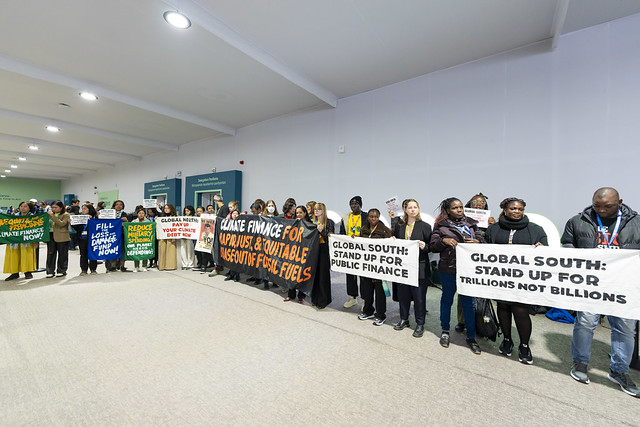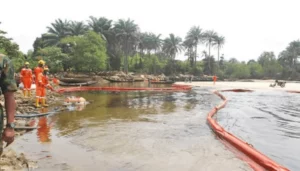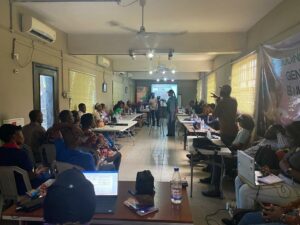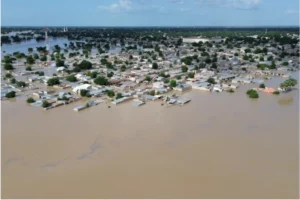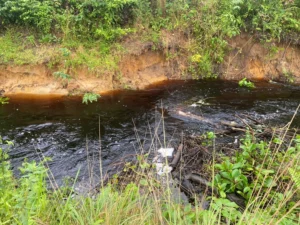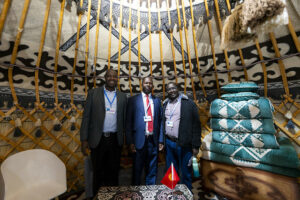
Energy buzzes in the air at COP29 as world leaders, activists, and industry giants come together, all supposedly working towards an end to the climate crisis. But beneath the hopeful rhetoric and artfully scripted speeches, another story unfolds: one of manipulation, greed, and exploitation. Our team witnessed this firsthand in a sobering interaction with a lobbyist peddling outdated biogas solutions, a harsh reminder of how corporate interests hijack these platforms for profit off false narratives.
It was no ordinary sales pitch. It came draped in the garb of a representative of environmental activism, presenting biogas technology that had already failed as unaffordable, inefficient, and unsustainable ten years prior in the Netherlands, but that proved to be a “perfect fit” for Africa. Why? Some very unsubstantiated reasons, the “arguments” laced with a tinge of condescending tone, bypassing evidence from science and the lived realities of the Global South. And then, the hidden motive became clear: exploit Africa as a testing ground for discarded solutions, rebranded as “green innovation.”
This is hardly an isolated incident. Corporations have long utilized the COP process for greenwashing their image by marketing so-called “solutions” that are anything but. These frequently aim at the Global South and use the structural inequities and governance loopholes found in those areas. The same song, the same dance, goes something like this:
Old Technologies, New Markets: Failed solutions from the Global North are being rebranded and sold as breakthroughs to countries in the Global South, despite their inefficiency and environmental impact.
These are often complemented by hard-to-trace incentives for local officials, further embedding corruption and undermining real climate action.
No Science, Just Salesmanship: There is a complete absence of data and proven research. Instead, emphasis has been placed on narratives crafted to attract local governments’ need for quick, visible “wins.”
Why Africa?
The Global South, and Africa in particular, is a lucrative market for such predatory tactics. Lax regulatory frameworks, combined with pressing developmental challenges, make it all too easy to sell harmful technologies as “perfect fits.” This, however, is not an issue of ignorance; it is actually outright exploitation of a region struggling for survival and sustainability.
At COP29, more than ever, the stakes are high. With the future of the planet in the balance, concentration needs to stay fixed on people and proven science-not corporate profits dressed up as climate solutions. As a team dedicated to climate justice, we have seen how the conversation can get derailed by opportunistic actors in a very short time.
We refuse to play along. To support such solutions would be to turn a blind eye to their negative impacts on communities and ecosystems. Africa does not need colonialist solutions dressed up in green wrapping paper; it needs inclusive, sustainable solutions embedded in local contexts and informed by scientific evidence.
The Way Forward
Addressing these challenges demands vigilance and transparency. Here are key steps to address the exploitation of platforms such as COP:
Unveil Greenwashing: Report and publicize corporate manipulations. Shine a light on the tactics used to promote damaging technologies.
Promote Local Solutions: Empower communities to develop and implement locally adapted climate solutions.
Demand Accountability: Use pressure for oversight over corporate lobbying activities at international climate events.
Enhance Climate Literacy: Engage stakeholders with knowledge to critically evaluate proposed technologies and policies.
At COP29, as elsewhere, the message must remain clear: Africa deserves better than hand-me-down technologies and exploitative deals. The future of climate action lies in empowering people, embracing science, and rejecting the profiteering that undermines genuine progress.
As we walked away from that encounter, one thing was certain in our minds: COP29 is a battleground-it is not just about climate solutions, but also about the soul of the movement. And for the love of the planet, the fight for justice shouldn’t waver.
Written By:
Diolu Tobechukwu Prosper
Co-founder, Lincgreen Climate Change Initiative
Published on @COP29blog

